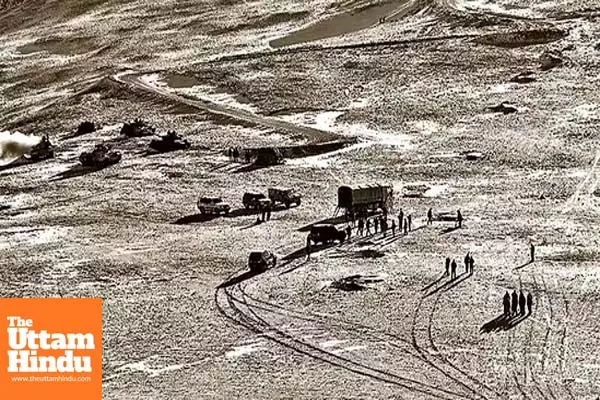
India-China military pullback commences in Depsang and Demchok regions

New Delhi (The Uttam Hindu): The Indian Army and the Chinese People's Liberation Army (PLA) are set to complete their disengagement process by October 28-29, with patrols scheduled to resume on October 30-31. This disengagement will specifically apply to the Depsang and Demchok regions, marking a significant step in de-escalating tensions between the two countries along their contested border. However, it is important to note that this agreement does not extend to other friction points, where tensions have remained high.
As part of this disengagement agreement, both sides will withdraw to their pre-April 2020 positions. This move is significant as it represents a return to the status quo that existed before the border standoff escalated in the spring of 2020. The two armies will resume patrolling the areas they had previously monitored before the conflict, with official sources confirming that regular meetings between ground commanders will continue. These meetings are crucial for maintaining communication and coordination, helping to prevent misunderstandings or confrontations.
To facilitate a smooth disengagement, both sides have established clear protocols. A specific strength of troops designated for patrols has been agreed upon, ensuring that both armies are aware of when patrols are scheduled to occur. This transparency is intended to reduce the risk of accidental clashes or miscommunications that could reignite tensions. Additionally, all temporary infrastructure, such as sheds and tents set up during the standoff, will be dismantled, further signaling a return to normalcy in these regions.
Surveillance will continue to be a priority for both the Indian and Chinese forces in the Depsang and Demchok areas. Each side will monitor the other’s activities to ensure compliance with the disengagement agreement. The focus on surveillance indicates that while disengagement is a positive step, both countries remain vigilant regarding their national security interests. The patrolling points in Depsang and Demchok are particularly significant, as they are locations where Indian forces had maintained a presence prior to the tensions that arose in 2020.
This disengagement process is part of ongoing diplomatic efforts to resolve the border dispute peacefully. The situation along the India-China border has been a point of concern for both nations, and maintaining open lines of communication is vital for preventing future conflicts. The importance of this agreement is underscored by the broader context of India-China relations, which have been strained due to various geopolitical factors.
While the disengagement marks a hopeful development, it remains to be seen how both sides will navigate the complexities of their relationship moving forward. Continued dialogue and adherence to the agreed-upon protocols will be essential for sustaining peace in the region. As both the Indian Army and the Chinese PLA prepare to return to their established patrols, the success of this disengagement will hinge on mutual respect and commitment to the terms outlined in their agreement. The international community will be watching closely to see how this situation evolves and whether it paves the way for a more stable and cooperative relationship between India and China in the future.

